
Questions are circulating about whether BMC mining was granted its license fairly and whether it should be paying taxes on all the bauxite it’s exporting.
More than 100 shipments of bauxite have been exported from Rennell Atoll since Bintang Mining Company (SI) Ltd (BMC) began operations there in 2013, landowner Erick Tema told SIBC News.
But did the Solomon Islands benefit from that operation?
It’s a question currently sparking debate on social media and among the public.
Dr. Luke Forau, governor of the Central Bank of the Solomon Islands, told SIBC News, that even though BMC is exempt from paying export taxes, the Rennell bauxite exports are still contributing to the country’s economy.
“In terms of foreign exchange, BMC contributed SBD$131 million [US$16.2 million] in 2019, and in 2020, it contributed to SBD$142 million,” he said.
Section 16 of the Income Tax Act provides for the Minister of Finance and Treasury to exempt certain income and people from paying tax.
The provision allows the government to use tax exemptions to encourage business investment and economic development in the Solomon Islands.
Exemptions, however, cost the government revenue and create distortions in the economy by discouraging businesses or sectors that do not receive exemptions.
Tax exemptions have been used to both benefit and penalize mining operations on Rennell.
In 2017, following a leaked SMS text message exchange that allegedly revealed Prime Minister Manasseh Sogavare’s involvement in the Rennell mining operation, his government defended their position saying, the leaked SMS messaging is a penalty tax to Bintang Borneo, which had been operating illegally in the country.
The 20 percent export tax that the government had imposed on Bintang Borneo was removed when BMC Ltd started operations. Former Customs Comptroller, the late Nathan Kama, earlier said that such action was legal according to customs laws.

“There is no export duty on bauxite that is mined legally, like that of BMC SI Ltd,” he said.
Current Solomon Islands Customs Comptroller, Jim Sutton, confirmed to SIBC News that BMC is currently exempt from having to pay any export duties.
“There is no export duty per se, but the exporter must pay 3% royalty from every export, part of which goes to landowners,” he said.
The exact nature of the tax exemption has been a long-standing issue since the inception of the mining operation almost a decade ago since authorities have not yet clarified what took place.
Government Opposition Leader Hon. Mathew Wale has called on the tax commissioner to publicly explain the tax exemption.
Meanwhile, environmental activist Lawrence Makili questioned how much revenue the country could have earned if proper deals had been made in the first place.
“The sad part of all these so-called developments is that our elected officials are not fighting for the people, instead, they keep entertaining foreigners with nothing to benefit the country,” he said.

While tax exemptions have been continuously depriving the country of revenue of its natural resources, the environmental damage caused by oil spills like that of the MV Solomon Trader last year is just as costly, Makili added.
The Radio Australian Pacific Beat program recently estimated that the economic losses caused by the oil spill in Kangava Bay when the MV Solomon Trader which ran aground in Rennell Island could be as high as AUD$50 million dollars.
Investigation underway
Director of Mines Division Nicholas Biliki said BMC’s operation in Rennell Island is due to be reviewed next year.
He said BMC’s operations do not comply with the mining requirements, and yet the-then government granted the company a 25-year mining lease in 2014.
“Currently, that project is one of our headaches here. It’s a bit messy. The company does not comply with the mining requirements, but somehow, the mining lease was granted,” he said.
“Thus, the operation is due to be reviewed next year. We are hoping this is a chance to have some improvement to the whole operation, depending on BMC’s compliance with our regulations.”
In 2013, Asia-Pacific Investment Development (APID), which had been running logging operations on Rennell Island, acquired the whole of West Rennel from the Solomon Islands government, a land acquisition process that landowners do not agree with.
Landowners challenged the granting of the West Rennell land title to APID at the High Court, but the court did not rule in their favor.
“Later we were told that our lawyers failed to present our submissions,” said Erick Tema.
“We still looking for a lawyer who can support us with our case, as we don’t have sufficient funds to pay for legal people,” he added.
APID, which has no mining experience, then subleased the West Rennel Mining Tenament to an Indonesian mining firm, Bintang Mining SI Company Ltd.
The 25-year mining lease will lapse in 2033.
Former Solomon Islands Prime Minister Rick Houeniowela said the West Rennell Land parcel PN.298-005-1 far exceeded that provided for by the Lands and Titles Act, meaning it could have been granted wrongly.
“The mining lease may have been granted to APID without proper procedures being followed,” Houeniowela said.
In October of this year, West Rennell leaders, including the Rennell and Bellona Member of Parliament Dr. Kaitu Angikimua, and the Provincial Government deregistered the West Rennell land title from APID. Dr. Angikimua told SIBC News that the land has been registered “by mistake.”
The question of whether or not the mining operation will stop remains.
by Charley Piringi
Source: First published by SIBC News, Internews in November 2020
